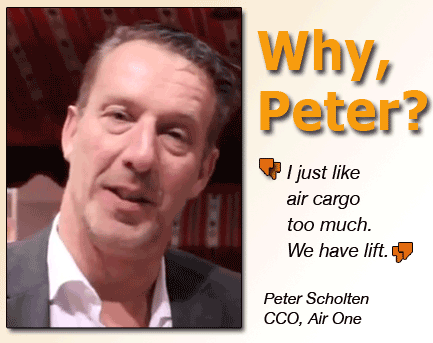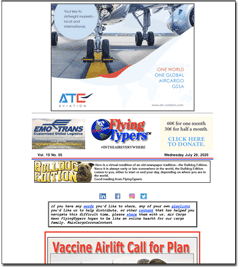|
Sometimes in the process of getting it
there, when air cargo delivery must meet the need, factoring in all the
variables including new possibilities can be illuminating, enlightening,
and ultimately even helpful.
Here we look briefly into the expanded usage
of a process called lyophilization.
Lyophilization, also known as freeze drying,
is a dehydration process that takes place after a product has been frozen.
Lyophilization is gaining popularity in the life sciences for reagents
and assays due to its numerous benefits, including extended shelf-life
and ease-of-use.
The world now awaits a COVID-19 vaccine,
reportedly a two-shot sequence, with delivery to 8 billion people along
with other therapeutics, that would see that dreaded one-way trip to the
hospital turn into a roundtrip back to life.
The Need For Speed
How to get the help to every part of the
world quickly is viewed in some quarters as an overwhelming challenge.
In parts of the world where people cannot
easily be reached or are placed on a lower priority on the vaccine chain,
thinking about how to deliver a widespread cure bears a bit of thought.
When it comes to relief from COVID-19, time
is not on our side.
Forget about thinking outside of the box.
In a global emergency how about thinking with no boxes at all?
It Takes Good Timing
It may be too early for wide-based delivery
of the COVID-19 serum and therapeutics in a freeze-dried form, but by
accelerating technologies already in place, pharmaceuticals via freeze
drying could reach people in places where cold-chain pharma simply cannot.
No doubt freeze drying process has important
applications in the pharmaceutical and biotechnology industries in the
forseeable future.
Emerging Technologies
Currently pharmaceutical freeze drying doesn’t
get the big headlines, but the process driven by the global need for serums
and plasmas could be at the edge of wide acceptance.
In some sectors, freeze drying is standard
process used to stabilize, store or increase the shelf life of drug products
and other biologicals.
The Process
Freeze drying pharmaceuticals uses the aforementioned
process called lyophilization to lower the temperature of the product
to below freezing, and then a high-pressure vacuum is applied to extract
the water in the form of vapor.
The vapor collects on a condenser, turns
back to ice and is removed.
Finally, a gradual temperature rise extracts
all remaining 'bound' moisture from the product.
This process retains the physical structure
and preserves the material for storage or transport.
Kibblewhite Reports From New Zealand
 “With freeze drying, delicate, unstable
or heat-sensitive drugs and biologicals can be dried at low temperatures
without damaging their physical structure.
“With freeze drying, delicate, unstable
or heat-sensitive drugs and biologicals can be dried at low temperatures
without damaging their physical structure.
“Freeze-dried products can be reconstituted
quickly and easily, which is particularly valuable in the case of the
COVID-19 emergency vaccines and antibodies,” says Blair Kibblewhite,
Sales & Marketing Manager of Cuddon Freeze Dry located in South Island,
New Zealand.
Cuddon is a manufacturer of freeze-dry machines
that are sold worldwide.
Although Cuddon builds equipment that in
some applications might accelerate freeze-dried pharma, Kibblewhite admits
the process while possible, based on demand is not foremost in the company
plan.
But in this brave new world of 2020 Cuddon,
to their credit, like many others in the rest of the world, seems open
for new ideas.
“We have been manufacturing commercial
and industry freeze dryers for over 55 years," Blair said, “however
in that time we have only built a couple of small freeze dryers that were
suited to the pharma market.
“Although some clients have used our
commercial built dryers for pharmaceutical products, their specification
was not at the level of a pharmaceutical freeze dryer.”
After Blair said those words, visions of
people in seats with igloo coolers filled with ice-packs and serum kept
popping up.
“With the latest sales of our freeze
dryers, none are being used directly for COVID-19.
“However, there is recent word that
Lactoferrin, a dairy industry-based therapeutic could be used in some
way to thwart COVID-19.
“Lactoferrin is an extract of whey.
“Whey protein is (routinely) dried
in Cuddon Freeze Dryers,” Blair Kibblewhite said.
Generational Freeze For 100 Years
 In Kingston, New York about 90 minutes north
of New York City, Millrock Technology Pharmaceutical Freeze Drying says
it “is always looking to provide new innovations to the pharmaceutical
freeze drying industry.”
In Kingston, New York about 90 minutes north
of New York City, Millrock Technology Pharmaceutical Freeze Drying says
it “is always looking to provide new innovations to the pharmaceutical
freeze drying industry.”
T. N. Thompson, (TNT), President, Millrock
Technology said, “As an innovator, we listen to the needs of the
market, while providing value in our product line.
“We offer cutting-edge technologies
and optimized methods of pharmaceutical freeze drying. Millrock Technology,
Inc. manufactures robust and dependable freeze dryers, customized for
the pharmaceutical/biotech marketplace.”
Millrock with over 100 years combined experience
designing, manufacturing and supporting freeze-drying equipment, is the
only “3rd generation” (grandfather, father, son) freeze dryer
company in the world.
The Thompson family also founded two other
very successful freeze dryer manufacturing companies.
Millrock Purdue NSF Partnership
Recently Millrock Technology partnered with
Purdue University on a U.S. National Science Foundation-funded project
to develop “Self-Driving” pharmaceutical freeze dryers.
“Pharmaceutical freeze drying has
a reputation of being an expensive and time-consuming process, but the
latest freeze drying innovations are saving money and time, as well as
changing the face of freeze drying forever,” TNT said.
 “We are committed to developing these
innovations, and pleased to be part of a new partnership with researchers
at Purdue University who are working toward more cost-efficient manufacturing
through automated lyophilization,” Purdue School of Aeronautics
and Astronautics said after receiving an NSF grant of $750,000 to develop
real-time sensor technologies, computational modeling, and bioanalytical
tools for closed-loop lyophilization.
“We are committed to developing these
innovations, and pleased to be part of a new partnership with researchers
at Purdue University who are working toward more cost-efficient manufacturing
through automated lyophilization,” Purdue School of Aeronautics
and Astronautics said after receiving an NSF grant of $750,000 to develop
real-time sensor technologies, computational modeling, and bioanalytical
tools for closed-loop lyophilization.
Millrock is providing the freeze drying
technology that researchers are using for the NSF project at LyoHub in
Purdue’s Discovery Park.
“Millrock Technology is excited to
work with Purdue on this project,” TNT said.
“The sensors and concepts proposed
by Purdue in combination with the techniques and technologies developed
by Millrock throughout the years is promising to produce major improvements
in the freeze drying process.”
Cut Production Time By 50%
One major hangup is that current freeze
drying methods lack real time control or measurements, and inputs are
fixed at a constant value.
A typical production lyophilization cycle
can take up to two weeks, because without in-process product monitoring
and closed-loop control, the cycles are overly conservative and lengthy.
With sensors delivering real-time measurements,
the use of heat transfer models, and the ability to constantly change
the conditions inside the freeze dryer, the cycle can be optimized.
The result: significant time and cost
savings. Purdue’s project aims to create and implement a closed-loop
“autopilot” system in which product state measurements are
taken during drying and fed back into a controller.
Purdue’s team believes this type of
system could cut the freeze drying cycle time by as much as 50 percent.
More from Purdue University School of Aeronautics
and Astronautics here.
When Speed Is The Need
 The idea or dream of a portable yet stable
serum for COVID-19 in a freeze-dried form is not that far-fetched.
The idea or dream of a portable yet stable
serum for COVID-19 in a freeze-dried form is not that far-fetched.
Bavarian Nordic is already producing a freeze-dried
vaccine for rabies in the U.S. only eight months after completing the
acquisition of the manufacturing and global rights to Rabipur®/RabAvert®
(Rabies Vaccine) and Encepur® (Tick-Borne Encephalitis Vaccine) from
GlaxoSmithKline plc (GSK).
 “Every 10 minutes a person in the
U.S. starts post-exposure rabies vaccinations after a suspicious animal
bite,” Bavarian Nordic said.
“Every 10 minutes a person in the
U.S. starts post-exposure rabies vaccinations after a suspicious animal
bite,” Bavarian Nordic said.
Left untreated, rabies is almost always
fatal.
RabAvert is a sterile, freeze-dried rabies
vaccine for both pre-exposure and post-exposure vaccination in all age
groups.
“At Bavarian Nordic, we have a compelling
infrastructure that aligns with the critical vaccine market needs from
basic research and development to commercial operations, manufacturing
and distribution,” declared Paul Chaplin, President and CEO of Bavarian
Nordic.
Freeze-Dried Beads of Hope
Another application for serum that might
see wider application comes from USA Argonaut Manufacturing Services that
provides contract manufacturing for biopharmaceutical, diagnostic, and
life science organizations.
Argonaut is all cutting-edge solutions including
lyophilization for reagents and barrier isolation technology for parenterals.
The Argonaut manufacturing site is located
in Carlsbad, CA (45 minutes north of San Diego).
An Ambient Advantage
Argonaut insists transitioning serums from
liquid solutions to its product branded “LyoDose” either in
beads or lyophilized powders “can generate significant technical
advantages.
“LyoDose beads are spheres of customizable
lyophilized material that contain a specified volume of material per reaction,
while maximizing surface area for rapid reconstitution,” the company
said.
Argonaut claims, “the operational
benefits are great and may encompass lowering cold chain costs with room
temperature storage ,cutting waste by reducing carbon footprint (Green
Initiatives).
In application the company notes fewer user
errors by reducing mixing steps and service calls as well as preventing
obsolete inventory by extending shelf-life.
“Sometimes conventional powders are
preferred applications, and Argonaut delivers these with the same room
temperature storage and stability as LyoDose beads,” the company
said.
Argonaut said it is currently able to produce
“500K+ LyoDose beads per week, and most recently had been scaling
production up to 1M+ per week.”
While those numbers seem like a drop in
the bucket measured against the scale of need for vaccines and therapeutics
to defeat COVID-19, a common complaint about the current ability worldwide
to provide this lyophilized antidote, we recall last February that the
world did not have enough ventilators.
But thinking about the need from high tech
to a company down in New Zealand, to a totally Pharma-focused company
up in Kingston, New York and in Carlsbad and undoubtedly many places in
between recalls in recent history how the Ford Motor Company in Detroit
and some other legacy companies, both in the U.S. and abroad answered
the call and changed their production and got busy making life-saving
ventilator machines earlier this year.
“It was the best of times, it was
the worst of times,” are the opening words of Charles Dickens epic
novel A Tale of Two Cities.
In 2020 our hope is that the best will come
from the worst.
Geoffrey
|





 Up
pops cargo pro Peter Scholten, now serving as CCO for London-based Air One
that serves as sales agent for Aerotranscargo, an all-cargo
outfit based in Sharjah, fielding four B7474Fs.
Up
pops cargo pro Peter Scholten, now serving as CCO for London-based Air One
that serves as sales agent for Aerotranscargo, an all-cargo
outfit based in Sharjah, fielding four B7474Fs.
